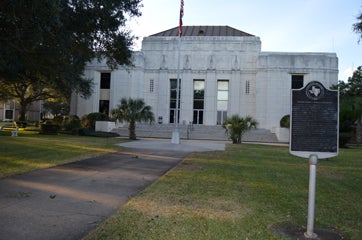Jade Ave. Business Park to be sorting area for debris removal
Published 2:08 pm Tuesday, September 12, 2017
A Port Arthur Economic Development Corporation business park is going above and beyond to serve as a temporary debris site.
The Board of Directors of the PAEDC approved using a portion of the Jade Avenue Business Park as a temporary debris management site for the city of Port Arthur following damages from Hurricane Harvey at their regular meeting on Monday night.
The agreement between the two parties reads the city, due to Harvey, is in an emergency event and must coordinate and facilitate the management of debris deposited on public lands and public right-of-way.
Because of inherent danger posed by uncollected debris, it is in the public interest that the city protect against the accumulation of debris and its accompanying hazard to human life and property.
The city’s Disaster Management and Recovery Plan states that the city by and through its public works department will coordinate the establishment of temporary and permanent sites to accept debris.
Floyd Batiste, executive director of the PAEDC, said the city asked to use property on Jade Avenue, Batiste, however, had some concerns because of the debris being placed on the soil and it becoming contaminated, not knowing what will happen to the property and how long it would take.
“I could not recommend that to the board,” he said. “I recommended the property across from the (Bob Bowers) civic center (on Highway 73). The Jade Avenue Park has a lot of big investments and we were concerned there may be an odor.”
Batiste said after seeing all the debris around the city, though, he didn’t think the city was prepared for Harvey. The six acres at the Highway 73 park would not be large enough to help in the city’s plans for clean up.
The agreement for Jade Avenue states the PAEDC wants the soil to return to its original condition and there are certain things the Texas Commission on Environmental Quality will monitor.
“They’ll use 20 acres in the southwest corner. They will need to build a shell road to get back there. It will border the Drainage District (#7) property and the levee. It shouldn’t affect anything,” Batiste said. “Armando (Guiterrez, public works director) shared the same thoughts as me where to place this and we never got together before about this.”
Guiterrez said the city must follow FEMA guidelines. He told the board it will take four months to collect everything.
Someone will separate the debris at Jade Avenue, Batiste explained, pick it up and bring it to the city landfill on Highway 73.
“It (Jade Avenue) will be a sorting area,” Batiste said.
In other PAEDC business, the board approved increasing the amount of a microloan to small businesses.
Currently the program has $115,000 to loan to small businesses. It is city money, but the PAEDC manages it.
The board increased the amount to $150,000 to help businesses affected by Harvey.
A memorandum described the microloan program as supporting entrepreneurial and small business endeavors, which is the backbone of the local economy.
“The PAEDC Micro Loan Program will provide a direct funding source for qualifying small businesses in the city of Port Arthur that have the ability to repay a loan, but may not be able to obtain financing through traditional sources,” it read.
Batiste said the program requires a credit score of 600 or higher to qualify. The interest rate is a fixed rate of prime plus one.
This change in the program must be communicated with the Port Arthur City Council, but Batiste thinks they may want to change the interest rate from either 2 percent to 3 percent, for 3 percent to 4 percent.
The loan terms will be one to three years. There is no penalty for pre-payment of the loan.
Collateral will be taken equal to 100 percent of the loan to secure the note. The applicant must be a for-profit business located in the city of Port Arthur with annual gross revenues of less than $150,000.
The approved loans may be used for: equipment, increasing inventory, marketing, working capital and site improvements.
The maximum funding limits are based on gross revenues:
Gross revenues of less than $20,000 may borrow up to $15,0000.
Gross revenues between $20,001to $40,000 may borrow up to $20,000.
Gross revenues between $40,001 to $60,000 may borrow up to $25,000.
Gross revenues of more than $60,000 may borrow up to $30,000.
Batiste said many businesses in Texas didn’t have flood insurance and they need capital to get started again.
“How will the community take advantage of these opportunities?” he asked.





